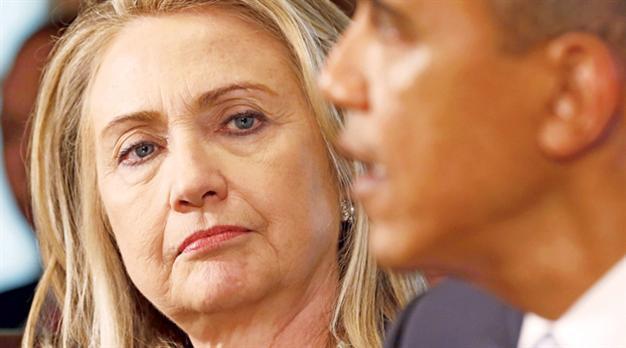US focus on African security ties rising
WASHINGTON - Reuters

U.S. President Obama’s (R) top diplomat Hillary Clinton is set to visit Africa’s newest nation, South Sudan.
U.S. Secretary of State Hillary Clinton departs this week on a trip that will take her both to Africa’s newest nation, South Sudan, and on a visit to the continent’s elder statesman, 94-year-old anti-apartheid icon Nelson Mandela.
While Clinton’s public focus will be on Africa’s democratic achievements and economic potential, the trip also underscores U.S. security ties in the face of an array of growing threats, from Islamist extremists to narcotics cartels.
“The security threats are becoming much more visible and in some ways dangerous than they were before,” said Jennifer Cooke, the head of the Africa program at the Center for Strategic and International Studies in Washington.
Clinton’s trip was set to begin Senegal, and continues on to South Sudan, where she will be the most senior U.S. official to visit since the country declared independence in July 2011. Further stops include Uganda, Kenya, Malawi and South Africa, the State Department said. The Department said Clinton would use her visit “to encourage strengthening of democratic institutions and human rights, while also reinforcing Uganda as a key U.S. partner in promoting regional security.”
Clinton is expected to highlight U.S. programs on development, education and HIV/AIDS -- long the backbone of U.S. engagement with Africa -- as well as U.S. economic interest in a continent whose rich resources and enviable growth rates have drawn rival suitors including China and India.
She will also likely emphasize projects for women and girls, one of her central themes in a job she says she will leave in January even if President Barack Obama is elected to a second term.
But Clinton’s visit is also part of a U.S. push to broaden security partnerships with key countries such as Uganda and Kenya, ties that are growing fast despite sometimes serious U.S. concerns over democratic governance.
We always see Obama as one of our own: Kimenyi
Obama laid out his policy for Africa in a speech in Ghana in July 2009, saying the United States stood ready to help African nations as they work to improve governance, fight corruption and resolve regional conflicts.
His speech led to widespread hopes on the continent that the first U.S. president with African roots would follow through with new policies to help achieve those goals.
“Africans will always see Obama as one of our own, so we are reluctant to criticize,” said Mwangi Kimenyi, a Kenyan academic and director of the Africa Growth Initiative at the Brookings Institution. “But it turns out our expectations for the president was a bit overrated and unrealistic. He could have been more courageous and done more.”
The White House last month released a policy paper on Africa, repeating its commitment to strengthening democracy and spurring economic growth but lacking a single signature project which could cement Obama’s Africa legacy.
Instead, attention has focused on AFRICOM, the unified U.S. Africa Command that the Pentagon established in 2007. It is playing an increasingly important role as the U.S. pumps resources into training African militaries.
Washington has reacted with increasing alarm as militant groups such as Somalia’s al Shabaab, Nigeria’s Boko Haram and al Qaeda’s African wing based in the vast Sahel region open new fronts to advance Islamic extremism.
